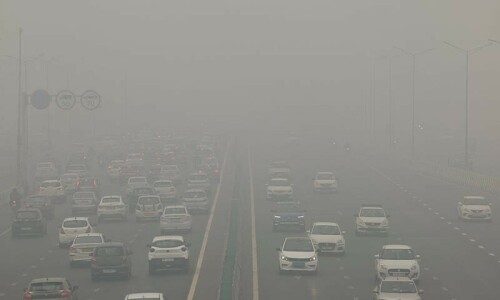INTO the cauldron of Middle East and Gulf politics, the militant Islamic State group has once again inserted itself with potentially terrifying consequences for a region already mired in tension, conflict and war.
The twin terrorist strikes in Tehran yesterday were designed not just to inflict casualties on the Iranian people, but also to send a signal that the state of Iran itself is under attack.
The choice of targets — the Iranian parliament and the mausoleum of Ayatollah Khomeini, who founded the present-day Iranian state — could not be more potent.
The IS, with its explicitly sectarian agenda, appears to have demonstrated that it has the resources to strike in the heart of the most important Shia-majority country in the Muslim world.
And it has managed to do so at a time when, instead of uniting against the threat the group poses to all nations, the Muslim world is riven by some of the most bitter politics and disputes in years.
Much will depend on how the Iranian state reacts and the position that the Saudi Arabia-led cluster of Muslim countries takes on the attack.
The sensible approach is clear: Saudi Arabia should recognise the peril that the IS poses to all states and immediately adjust its increasingly hawkish approach to Iran and countries allied with it; Iran should reconsider its provocative search for more influence in the Middle East and the Gulf and, instead, focus on the necessary fight against the IS.
But the sensible approach is likely to have few takers and already hawkish elements in Iran have suggested that Saudi Arabia may have had a role in the Tehran attacks.
With Tehran in recent years accused of cultivating sectarian proxies and non-state militant groups across swaths of the Middle East, the possibility of a fresh wave of violence across the region cannot be ruled out.
Yet, more conflict cannot be regarded as a foregone conclusion in a region where historical rivalries and even enmities have been managed for long stretches.
While the Middle Eastern and Gulf countries will have to take responsibility for maintaining the peace between themselves, two factors appear to have contributed to the new imbalances in the region.
A metastasising IS is clearly a threat to everyone — a terrorist super-group that threatens all countries but that few states appear to truly understand.
It is impossible for states to manage relations among themselves while the IS remains active on the scale it is today.
The second factor is US President Donald Trump and his seemingly mindless quest to destabilise the world order and supplant it with his vision of ‘America First’.
From the Riyadh summit last month have already flowed dangerous new ideas and measures, not least the rapid isolation that Qatar now faces at the hands of fellow GCC members.
Ignorance and recklessness can trigger the most profoundly destabilising of consequences.
Published in Dawn, June 8th, 2017











































